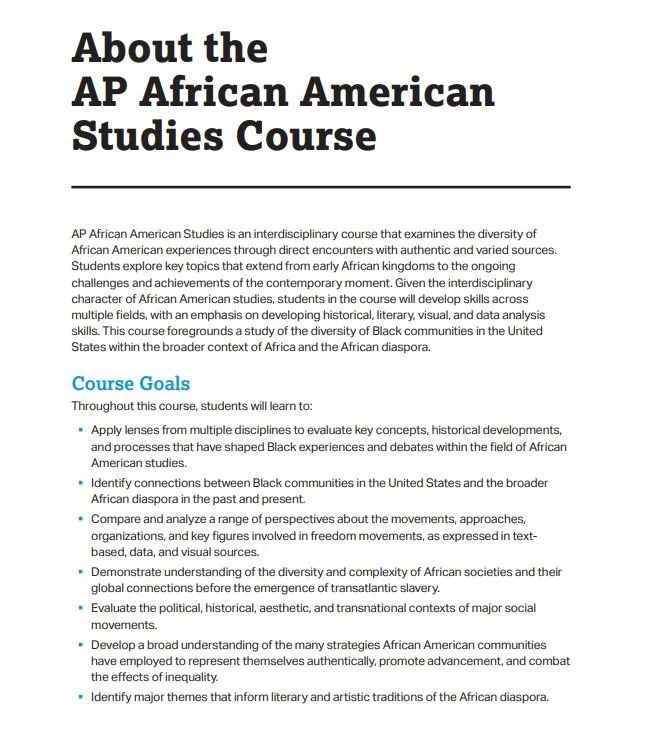AP African American Studies: The Hypocrisy of Ron DeSantis' Ban
Photo from College Board.
Peyton Impola
Critical Race Theory has been defined as an intellectual examination of how laws, society, politics, and the media are shaped and have shaped race. Critical Race Theory is a high level social theory, and is predominantly tackled by legal scholars, high level academics, and sociologists. It is highly unlikely that a student would encounter CRT in their first four years of college–nevertheless in elementary, middle, or high school. Recently, Florida Governor Ron DeSantis announced that public schools would be banned from participating in the College Board’s pilot of AP African American Studies, denouncing the course as “indoctrination” and labeling it as Critical Race Theory. However, this course is very clearly not Critical Race Theory, and would make for a useful and necessary addition to the courses offered by the College Board.
The idea for AP African American Studies is not a new one. For years, critics have voiced opposition to the College Board’s history courses, which typically cover predominantly white history. While some classes, such as AP US History, do touch on subjects pertaining to African American history, there is no major curriculum solely focused on the subject matter. In 2020, the College Board reshaped curriculum in multiple courses to more accurately reflect the African diaspora. The very next year, it was announced that in 2022-23 an AP African American Studies course would be piloted. Sources within the College Board have allegedly revealed that the course covers a broad spectrum of topics–ranging from the Harlem Renaissance in America, to the influence and rule of Queen Nzinga in Northern Angola. The course also makes a concerted effort to educate students on lesser known figures in Black history. This includes touching on activists who don’t receive broad recognition by the media–like Valerie Thomas–and the inclusion of queer theory and intersectionality within the course curriculum.
According to Politico, the curriculum is outlined as such:
Unit One: Origins of African Diaspora–this unit explores topics like the geography of the African continent, ethnolinguistic diversity among societies, and pre and post-slavery Africa.
Unit Two: Freedom, Enslavement, and Resistance–topics within this unit include African explorers in the Americas, and the origins and function of the Trans-Atlantic slave trade, as well as efforts to resist slavery.
Unit Three: The Practice of Freedom–this unit covers the history of Reconstruction, Jim Crow, and the early Civil Rights Movement.
Unit Four: Movements and Debates–this topic examines the Civil Rights Movement, the Black Arts Movement, student protests, Black women’s history, music, religion, and faith. This unit also deals with intersectionality, Black queer theory, incarceration & abolition, and movements for Black lives.
The College Board states that the curriculum aims to help students foster the following skill set:
Applying Disciplinary Knowledge
Written Source Analysis
Data Analysis
Visual Analytics
Argumentation
These skills are notable and necessary in order to thrive in a college setting in the 21st century. This course effectively prepares students for higher education, while allowing them to earn college credits–which is exactly what AP courses are all about.
Unfortunately, Governor Ron DeSantis does not agree. In particular, DeSantis has issues with the inclusion of queer theory and topics on the abolition of the prison system that are contained within this course. At a press conference in Jacksonville, the Governor stated, “We believe in teaching kids facts and how to think, but we don’t believe they should have an agenda imposed on them; when you try to use Black history to shoehorn in queer theory, you are clearly trying to use that for political purposes.” DeSantis then emphasized that Florida state law requires that classes teach Black history. However, just last year, DeSantis’ administration banned the teaching of Critical Race Theory and passed legislation barring anyone from teaching that there may be privilege or oppression attached to one’s race or skin color. It is clear that Florida is trying to water down Black history–they want to teach students about victories, like the emancipation of the slaves or the successes of the Civil Rights Movement, but don't want students to know about the circumstances from which those victories arose. White students are being sheltered, because the government does not want to risk them “feeling bad” about transgressions committed against the Black community throughout our nation’s history.
It can clearly be surmised that DeSantis believes AP African American Studies is indoctrination. He believes that he is protecting students from the “woke agenda.” Ironically, Florida state officials have begun considering a new “classical and Christian” alternative to the SAT. The state government has been in communication with the executives of an educational testing company that focuses on the “great classical and Christian tradition.” DeSantis has said nothing to the public about this new test–a far cry from the outrage he expressed over a course on Black history. The hypocrisy is blatant. DeSantis doesn’t care about protecting kids from indoctrination; he cares about making sure what Florida children are taught matches his party’s ideologies.
In the wake of this debate, Virginia has now begun to review the content of AP African American Studies, with the governor hoping to see if the class violates his executive order banning the instruction of “inherently divisive concepts.” Hopefully, DeSantis has not begun what will become a nationwide trend, but as of right now prospects look dark. As the culture wars continue to rage on, it is important that we recognize the importance of teaching history as it truly happened. Black history is American history, no matter how dark it may be at times. If students learn about the oppression of Black Americans throughout the history of the United States and feel guilty, we should not be trying to shelter them. We should be asking them which side of history they would have been on.
Sources
What’s really in the AP African-American Studies class DeSantis rejected?
Pilot: AP African American Studies
Virginia review AP African American studies class rejected by Florida
Florida weighing ‘classical and Christian” alternative to the SAT: report







